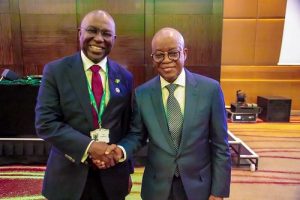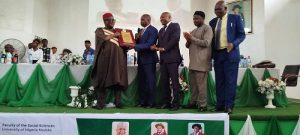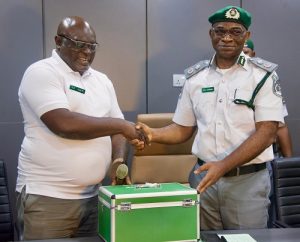Oyetola Moves to Implement National Policy for Blue Economy, Tasks Stakeholders on Action-oriented Strategy to Achieve Transformation

OYETOLA
By Francis Ugwoke
The Minister of Marine and Blue Economy, Chief Adegboyega Oyetola, CON, on Thursday convened a stakeholders meeting to discuss the implementation of the National Policy on Marine and Blue Economy which was approved recently.
Oyetola who spoke on the occasion held in Lagos, said the idea of the stakeholders forum was to come up with a unified, action-oriented strategy for the transformation of the nation’s marine sector.
He said that the approval of the National Policy on Marine and Blue Economy by the Federal Executive Council “marks a critical turning point providing a comprehensive framework to unlock value across our marine ecosystems”.
The Policy, according to him, “encompasses port infrastructure, maritime security, aquaculture, ocean governance, marine biotechnology, renewable energy, coastal tourism, and climate resilience”.
He told the stakeholders that the gathering was not ceremonial, but a working forum designed to develop a strategic roadmap for implementation.
He said, “we are here to design actionable frameworks, set implementation priorities, and assign clear institutional responsibilities. In doing so, we must focus on improving coordination, ensuring accountability, and building capacity at all levels.
“Since the inception of this Administration in 2023, the Federal Ministry of Marine and Blue Economy, in collaboration with its Agencies, has remained committed to the effective implementation of the Ministerial Deliverables assigned to it. I am pleased to report that the evaluation conducted by the Office of the Special Adviser to the President on Policy and Coordination, through the Central Results Delivery Coordination Unit (CRDCU), confirmed that the Ministry achieved a 75% performance score at the end of 2024, despite various institutional and operational challenges. This impressive achievement places the Ministry among the top performing MDAs in the Federation”.
Oyetola commended the efforts of the Delivery Task Teams across the Ministry and its Agencies, but urged them to remain focused and continue to pursue excellence in the discharge of their responsibilities.
He stated that the effective rollout of this Policy must be cross-sectoral, collaborative, and data-driven.
“Global trends have shown that effective citizen engagement and shared ownership of public policies yield better development outcomes. In a world facing complex, interconnected challenges, the voices of citizens and stakeholders are essential for driving innovation, ensuring transparency, and enhancing the legitimacy of government action”, he said.
The Minister told the participants to take note of the priorities, making it clear that the focus is on modernising our port infrastructure.
“The Federal Government has approved the contracts for the reconstruction of the Apapa and Tin Can Ports, under the Western Port Rehabilitation Programme. Procurement is ongoing for the Eastern Ports. These upgrades are complemented by the deployment of digital solutions, including the Port Community System, the E-Call-Up System, and a unified One-Stop-Shop for port clearance. These interventions are designed to reduce delays, boost investor confidence, and reposition Nigeria as a regional maritime hub.
“We are also working to strengthen indigenous shipping capacity. Through a public-private partnership model, we are pursuing the revival of a National Carrier. Additionally, the Nigerian Maritime Administration and Safety Agency (NIMASA) has commenced preparatory activities for the disbursement of the Cabotage Vessel Financing Fund. The process is being carefully structured to ensure transparency and regulatory compliance. When operational, the Fund will significantly expand opportunities for Nigerian shipping operators.
“On revenue and service delivery, we have recorded consistent year-on-year growth across our agencies. This is largely driven by our digitisation drive, which is improving operational efficiency, closing leakages, and attracting private capital into the sector”.
Oyetola also told the stakeholders that concerted efforts were being made to “streamline trade facilitation, reduce procedural bottlenecks, and eliminate overlapping regulatory burdens. Investment opportunities are expanding in bonded terminals, dry ports, inland logistics corridors, and warehousing infrastructure. Our overarching objective is to make Nigeria the maritime and logistics gateway for West and Central Africa”.
On the regional front, he disclosed that Nigeria is championing the operationalisation of the Regional Maritime Development Bank under the Maritime Organisation of West and Central Africa (MOWCA).
“With its headquarters here in Abuja, the Bank is poised to provide long-term financing for maritime infrastructure, thereby accelerating regional integration and supporting cross-border trade”, he said.
On the nation’s inland waterways, he said this is receiving priority attention, stating that the Ministry, through the National Inland Waterways Authority (NIWA), has introduced the Inland Waterways Transportation Regulation, 2023, and launched a nationwide water safety campaign.
“We have distributed over 42,000 safety jackets, deployed ferries, patrol boats, and trained water marshals. These efforts are already yielding results in reducing boat mishaps across the country and restoring confidence in water transport as a safe and viable mode of movement”.
The Minister also added, “Following the formal transfer of the Department of Fisheries and Aquaculture to our Ministry, we are repositioning the sector as a key contributor to food security and rural livelihoods. Ongoing efforts include reviving critical fishing terminals, automating licensing systems, and incentivising responsible private investments in both artisanal and commercial aquaculture.
“Maritime security remains central to our mandate. Through the Deep Blue Project, Nigeria has maintained zero piracy incidents in its territorial waters for three consecutive years. This achievement has earned us commendation from the international community and contributed to regional maritime stability. We are also proud that Nigeria’s offer to host the African Union Combined Maritime Task Force in Lagos has received endorsement from the AU Peace and Security Council.
“In line with our increasing international footprint, Nigeria has officially launched its bid to secure a Category “C” seat on the International Maritime Organisation (IMO) Council later this year. This will enhance Nigeria’s voice in shaping global maritime governance and affirm our commitment to best practices.
“The transition to a sustainable blue economy model is not automatic; it requires innovation, investment, policy coherence, and human capital development. This is why we are placing strong emphasis on capacity building, research, and the promotion of local content in every segment of the value chain”.
Among those who attended the event were the heads of maritime agencies, shipowners, terminal operators, freight forwarding associations, truckers, representatives of the Nigeria Customs Service, Nigerian Navy, Nigerian Agricultural Quarantine Service and Nigerian Technology Development Agency.
The Minister of Marine and Blue Economy, Chief Adegboyega Oyetola, CON, on Thursday convened a stakeholders meeting to discuss the implementation of the National Policy on Marine and Blue Economy which was approved recently.
Oyetola who spoke on the occasion held in Lagos, said the idea of the stakeholders forum was to come up with a unified, action-oriented strategy for the transformation of the nation’s marine sector.
He said that the approval of the National Policy on Marine and Blue Economy by the Federal Executive Council “marks a critical turning point providing a comprehensive framework to unlock value across our marine ecosystems”.
The Policy, according to him, “encompasses port infrastructure, maritime security, aquaculture, ocean governance, marine biotechnology, renewable energy, coastal tourism, and climate resilience”.
He told the stakeholders that the gathering was not ceremonial, but a working forum designed to develop a strategic roadmap for implementation.
He said, “we are here to design actionable frameworks, set implementation priorities, and assign clear institutional responsibilities. In doing so, we must focus on improving coordination, ensuring accountability, and building capacity at all levels.
“Since the inception of this Administration in 2023, the Federal Ministry of Marine and Blue Economy, in collaboration with its Agencies, has remained committed to the effective implementation of the Ministerial Deliverables assigned to it. I am pleased to report that the evaluation conducted by the Office of the Special Adviser to the President on Policy and Coordination, through the Central Results Delivery Coordination Unit (CRDCU), confirmed that the Ministry achieved a 75% performance score at the end of 2024, despite various institutional and operational challenges. This impressive achievement places the Ministry among the top performing MDAs in the Federation”.
Oyetola commended the efforts of the Delivery Task Teams across the Ministry and its Agencies, but urged them to remain focused and continue to pursue excellence in the discharge of their responsibilities.
He stated that the effective rollout of this Policy must be cross-sectoral, collaborative, and data-driven.
“Global trends have shown that effective citizen engagement and shared ownership of public policies yield better development outcomes. In a world facing complex, interconnected challenges, the voices of citizens and stakeholders are essential for driving innovation, ensuring transparency, and enhancing the legitimacy of government action”, he said.
The Minister told the participants to take note of the priorities, making it clear that the focus is on modernising our port infrastructure.
“The Federal Government has approved the contracts for the reconstruction of the Apapa and Tin Can Ports, under the Western Port Rehabilitation Programme. Procurement is ongoing for the Eastern Ports. These upgrades are complemented by the deployment of digital solutions, including the Port Community System, the E-Call-Up System, and a unified One-Stop-Shop for port clearance. These interventions are designed to reduce delays, boost investor confidence, and reposition Nigeria as a regional maritime hub.
“We are also working to strengthen indigenous shipping capacity. Through a public-private partnership model, we are pursuing the revival of a National Carrier. Additionally, the Nigerian Maritime Administration and Safety Agency (NIMASA) has commenced preparatory activities for the disbursement of the Cabotage Vessel Financing Fund. The process is being carefully structured to ensure transparency and regulatory compliance. When operational, the Fund will significantly expand opportunities for Nigerian shipping operators.
“On revenue and service delivery, we have recorded consistent year-on-year growth across our agencies. This is largely driven by our digitisation drive, which is improving operational efficiency, closing leakages, and attracting private capital into the sector”.
Oyetola also told the stakeholders that concerted efforts were being made to “streamline trade facilitation, reduce procedural bottlenecks, and eliminate overlapping regulatory burdens. Investment opportunities are expanding in bonded terminals, dry ports, inland logistics corridors, and warehousing infrastructure. Our overarching objective is to make Nigeria the maritime and logistics gateway for West and Central Africa”.
On the regional front, he disclosed that Nigeria is championing the operationalisation of the Regional Maritime Development Bank under the Maritime Organisation of West and Central Africa (MOWCA).
“With its headquarters here in Abuja, the Bank is poised to provide long-term financing for maritime infrastructure, thereby accelerating regional integration and supporting cross-border trade”, he said.
On the nation’s inland waterways, he said this is receiving priority attention, stating that the Ministry, through the National Inland Waterways Authority (NIWA), has introduced the Inland Waterways Transportation Regulation, 2023, and launched a nationwide water safety campaign.
“We have distributed over 42,000 safety jackets, deployed ferries, patrol boats, and trained water marshals. These efforts are already yielding results in reducing boat mishaps across the country and restoring confidence in water transport as a safe and viable mode of movement”.
The Minister also added, “Following the formal transfer of the Department of Fisheries and Aquaculture to our Ministry, we are repositioning the sector as a key contributor to food security and rural livelihoods. Ongoing efforts include reviving critical fishing terminals, automating licensing systems, and incentivising responsible private investments in both artisanal and commercial aquaculture.
“Maritime security remains central to our mandate. Through the Deep Blue Project, Nigeria has maintained zero piracy incidents in its territorial waters for three consecutive years. This achievement has earned us commendation from the international community and contributed to regional maritime stability. We are also proud that Nigeria’s offer to host the African Union Combined Maritime Task Force in Lagos has received endorsement from the AU Peace and Security Council.
“In line with our increasing international footprint, Nigeria has officially launched its bid to secure a Category “C” seat on the International Maritime Organisation (IMO) Council later this year. This will enhance Nigeria’s voice in shaping global maritime governance and affirm our commitment to best practices.
“The transition to a sustainable blue economy model is not automatic; it requires innovation, investment, policy coherence, and human capital development. This is why we are placing strong emphasis on capacity building, research, and the promotion of local content in every segment of the value chain”.
Among those who attended the event were the heads of maritime agencies, shipowners, terminal operators, freight forwarding associations, truckers, representatives of the Nigeria Customs Service, Nigerian Navy, Nigerian Agricultural Quarantine Service and Nigerian Technology Development Agency.





